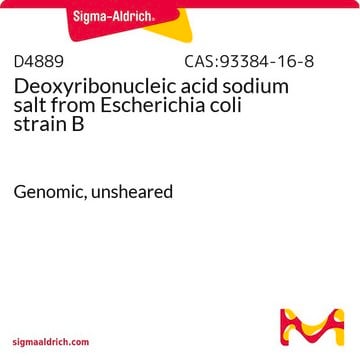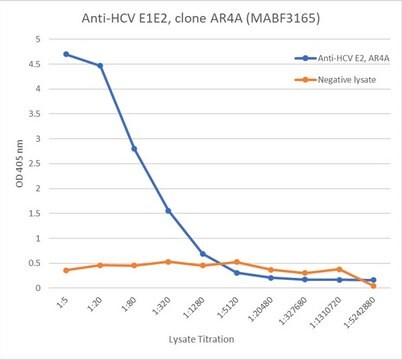HTS201RTA
Ready-to-Assay GPR109A Nicotinic Acid Receptor Frozen Cells
Human
Iniciar sesiónpara Ver la Fijación de precios por contrato y de la organización
About This Item
UNSPSC Code:
41106514
eCl@ss:
32011203
NACRES:
NA.81
Productos recomendados
product name
Ready-to-Assay GPR109A Nicotinic Acid Receptor Frozen Cells,
biological source
human
Quality Level
manufacturer/tradename
Ready-to-Assay
technique(s)
calcium flux assay: suitable
NCBI accession no.
detection method
fluorometric
General description
Millipore′s Ready-to-Assay GPCR frozen cells are designed for simple, rapid calcium assays with no requirement for intensive cell culturing. Millipore has optimized the freezing conditions to provide cells with high viability and functionality post-thaw. The user simply thaws the cells and resuspends them in media, dispenses cell suspension into assay plates and, following over night recovery, assays for calcium response.
Nicotinic acid (niacin), a vitamin of the B complex, is used clinically in high doses to decrease total plasma levels of cholesterol. Interestingly, the total cholesterol levels and low-density lipoprotein (LDL) concentrations decrease, while the high-density lipoprotein (HDL) concentrations increase with nicotinic acid treatment. The cholesterol-lowering effects of nicotinic acid result from inhibition of lipolysis in adipose tissue, which decreases plasma levels of free fatty acid (FFA) (Altschul et al., 1955; Carlson, 1963). In a study of nicotinic acid and myocardial infarction in the Coronary Drug Project (1966-1975), patients receiving 3 g/day nicotinic acid exhibited reduced rates of myocardial infarction (Coronary Drug Project Research Group, 1975). However, an unwanted effect of high doses of nicotinic acid is vasodilatation, occurring mainly in the upper body and face, known as flushing. Recently two receptors for nicotinic acid have been identified as class A G protein-coupled receptors that couple to Gi to inhibit accumulation of cAMP (Offermans, 2006). GPR109A (also known as HM74A in humans and PUMA-G in mice) is a high affinity receptor for nicotinic acid, whereas GPR109B (also known as HM74) is a low affinity receptor for nicotinic acid that is found in humans but not rodents (Wise et al., 2003). GPCR109A is found primarily in adipose tissue and immune cells. Millipore′s cloned human GPR109A-expressing cell line is made in the Chem-4 host, which supports high levels of recombinant GPR109A expression on the cell surface and contains optimized levels of a recombinant promiscuous G protein to couple the receptor to the calcium signaling pathway. Thus, the cell line is an ideal tool for screening for agonists, antagonists, and modulators at GPR109A.
Nicotinic acid (niacin), a vitamin of the B complex, is used clinically in high doses to decrease total plasma levels of cholesterol. Interestingly, the total cholesterol levels and low-density lipoprotein (LDL) concentrations decrease, while the high-density lipoprotein (HDL) concentrations increase with nicotinic acid treatment. The cholesterol-lowering effects of nicotinic acid result from inhibition of lipolysis in adipose tissue, which decreases plasma levels of free fatty acid (FFA) (Altschul et al., 1955; Carlson, 1963). In a study of nicotinic acid and myocardial infarction in the Coronary Drug Project (1966-1975), patients receiving 3 g/day nicotinic acid exhibited reduced rates of myocardial infarction (Coronary Drug Project Research Group, 1975). However, an unwanted effect of high doses of nicotinic acid is vasodilatation, occurring mainly in the upper body and face, known as flushing. Recently two receptors for nicotinic acid have been identified as class A G protein-coupled receptors that couple to Gi to inhibit accumulation of cAMP (Offermans, 2006). GPR109A (also known as HM74A in humans and PUMA-G in mice) is a high affinity receptor for nicotinic acid, whereas GPR109B (also known as HM74) is a low affinity receptor for nicotinic acid that is found in humans but not rodents (Wise et al., 2003). GPCR109A is found primarily in adipose tissue and immune cells. Millipore′s cloned human GPR109A-expressing cell line is made in the Chem-4 host, which supports high levels of recombinant GPR109A expression on the cell surface and contains optimized levels of a recombinant promiscuous G protein to couple the receptor to the calcium signaling pathway. Thus, the cell line is an ideal tool for screening for agonists, antagonists, and modulators at GPR109A.
Cell Line Description
- GPCR Cell Lines
- Host cells: Chem-4
Application
Human GPR109A GPCR frozen cells for Calcium Flux FLIPR Assays.
Biochem/physiol Actions
- GPCR Class:A
- Protein Target: GPR109A
- Target Sub-Family: Nicotinic Acid
Components
Pack contains 2 vials of mycoplasma-free cells, 1 ml per vial.
Fifty (50) mL of Media Component.
Fifty (50) mL of Media Component.
Disclaimer
This product contains genetically modified organisms (GMO).
Within the EU GMOs are regulated by Directives 2001/18/EC and 2009/41/EC of the European Parliament and of the Council and their national implementation in the member States respectively.
Storage Class
10 - Combustible liquids
wgk_germany
WGK 3
flash_point_f
Not applicable
flash_point_c
Not applicable
Certificados de análisis (COA)
Busque Certificados de análisis (COA) introduciendo el número de lote del producto. Los números de lote se encuentran en la etiqueta del producto después de las palabras «Lot» o «Batch»
¿Ya tiene este producto?
Encuentre la documentación para los productos que ha comprado recientemente en la Biblioteca de documentos.
Nuestro equipo de científicos tiene experiencia en todas las áreas de investigación: Ciencias de la vida, Ciencia de los materiales, Síntesis química, Cromatografía, Analítica y muchas otras.
Póngase en contacto con el Servicio técnico






